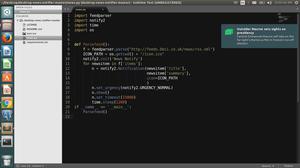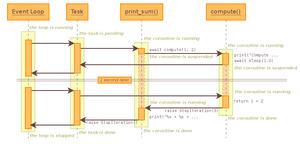30个极简Python代码,拿走即用

↑ 关注 + 星标 ,后台回复【大礼包】送你Python自学大礼
交流群,速进!
学 Python 怎样才最快,当然是实战各种小项目,只有自己去想与写,才记得住规则。本文是 30 个极简任务,初学者可以尝试着自己实现;本文同样也是 30 段代码,Python 开发者也可以看看是不是有没想到的用法。
def all_unique(lst):
return len(lst) == len(set(lst))
x = [1,1,2,2,3,2,3,4,5,6]
y = [1,2,3,4,5]
all_unique(x) # False
all_unique(y) # Truefrom collections import Counter
def anagram(first, second):
return Counter(first) == Counter(second)
anagram("abcd3", "3acdb") # Trueimport sys
variable = 30
print(sys.getsizeof(variable)) # 24def byte_size(string):
return(len(string.encode('utf-8')))
byte_size('????') # 4
byte_size('Hello World') # 11 n = 2;
s ="Programming";
print(s * n);
# ProgrammingProgramming s = "programming is awesome"
print(s.title())
# Programming Is Awesomefrom math import ceil
def chunk(lst, size):
return list(
map(lambda x: lst[x * size:x * size + size],
list(range(0, ceil(len(lst) / size)))))
chunk([1,2,3,4,5],2)
# [[1,2],[3,4],5]def compact(lst):
return list(filter(bool, lst))
compact([0, 1, False, 2, '', 3, 'a', 's', 34])
# [ 1, 2, 3, 'a', 's', 34 ]array = [['a', 'b'], ['c', 'd'], ['e', 'f']]
transposed = zip(*array)
print(transposed)
# [('a', 'c', 'e'), ('b', 'd', 'f')]a = 3
print( 2 < a < 8) # True
print(1 == a < 2) # Falsehobbies = ["basketball", "football", "swimming"]
print("My hobbies are: " + ", ".join(hobbies))
# My hobbies are: basketball, football, swimmingimport re
def count_vowels(str):
return len(len(re.findall(r'[aeiou]', str, re.IGNORECASE)))
count_vowels('foobar') # 3
count_vowels('gym') # 0def decapitalize(string):
return str[:1].lower() + str[1:]
decapitalize('FooBar') # 'fooBar'
decapitalize('FooBar') # 'fooBar'def spread(arg):
ret = []
for i in arg:
if isinstance(i, list):
ret.extend(i)
else:
ret.append(i)
return ret
def deep_flatten(lst):
result = []
result.extend(
spread(list(map(lambda x: deep_flatten(x) if type(x) == list else x, lst))))
return result
deep_flatten([1, [2], [[3], 4], 5]) # [1,2,3,4,5]def difference(a, b):
set_a = set(a)
set_b = set(b)
comparison = set_a.difference(set_b)
return list(comparison)
difference([1,2,3], [1,2,4]) # [3]def difference_by(a, b, fn):
b = set(map(fn, b))
return [item for item in a if fn(item) not in b]
from math import floor
difference_by([2.1, 1.2], [2.3, 3.4],floor) # [1.2]
difference_by([{ 'x': 2 }, { 'x': 1 }], [{ 'x': 1 }], lambda v : v['x'])
# [ { x: 2 } ]def add(a, b):
return a + b
def subtract(a, b):
return a - b
a, b = 4, 5
print((subtract if a > b else add)(a, b)) # 9 def has_duplicates(lst):
return len(lst) != len(set(lst))
x = [1,2,3,4,5,5]
y = [1,2,3,4,5]
has_duplicates(x) # True
has_duplicates(y) # Falsedef merge_two_dicts(a, b):
c = a.copy() # make a copy of a
c.update(b) # modify keys and values of a with the ones from b
return c
a = { 'x': 1, 'y': 2}
b = { 'y': 3, 'z': 4}
print(merge_two_dicts(a, b))
# {'y': 3, 'x': 1, 'z': 4}def merge_dictionaries(a, b)
return {**a, **b}
a = { 'x': 1, 'y': 2}
b = { 'y': 3, 'z': 4}
print(merge_dictionaries(a, b))
# {'y': 3, 'x': 1, 'z': 4}def to_dictionary(keys, values):
return dict(zip(keys, values))
keys = ["a", "b", "c"]
values = [2, 3, 4]
print(to_dictionary(keys, values))
# {'a': 2, 'c': 4, 'b': 3}list = ["a", "b", "c", "d"]
for index, element in enumerate(list):
print("Value", element, "Index ", index, )
# ('Value', 'a', 'Index ', 0)
# ('Value', 'b', 'Index ', 1)
#('Value', 'c', 'Index ', 2)
# ('Value', 'd', 'Index ', 3) import time
start_time = time.time()
a = 1
b = 2
c = a + b
print(c) #3
end_time = time.time()
total_time = end_time - start_time
print("Time: ", total_time)
# ('Time: ', 1.1205673217773438e-05) try:
2*3
except TypeError:
print("An exception was raised")
else:
print("Thank God, no exceptions were raised.")
#Thank God, no exceptions were raised.def most_frequent(list):
return max(set(list), key = list.count)
list = [1,2,1,2,3,2,1,4,2]
most_frequent(list) def palindrome(string):
from re import sub
s = sub('[\W_]', '', string.lower())
return s == s[::-1]
palindrome('taco cat') # Trueimport operator
action = {
"+": operator.add,
"-": operator.sub,
"/": operator.truediv,
"*": operator.mul,
"**": pow
}
print(action['-'](50, 25)) # 25from copy import deepcopy
from random import randint
def shuffle(lst):
temp_lst = deepcopy(lst)
m = len(temp_lst)
while (m):
m -= 1
i = randint(0, m)
temp_lst[m], temp_lst[i] = temp_lst[i], temp_lst[m]
return temp_lst
foo = [1,2,3]
shuffle(foo) # [2,3,1] , foo = [1,2,3]def spread(arg):
ret = []
for i in arg:
if isinstance(i, list):
ret.extend(i)
else:
ret.append(i)
return ret
spread([1,2,3,[4,5,6],[7],8,9]) # [1,2,3,4,5,6,7,8,9]def swap(a, b):
return b, a
a, b = -1, 14
swap(a, b) # (14, -1)
spread([1,2,3,[4,5,6],[7],8,9]) # [1,2,3,4,5,6,7,8,9]d = {'a': 1, 'b': 2}
print(d.get('c', 3)) # 3
推荐阅读
特朗普要求字节跳动放弃TikTok所有权,微软考虑收购,网友:明抢?
通过简历造假进了大公司之后......
肝了6个月,《Python黑魔法指南》全新版本 v2.0 上线发布
那个从深圳流水线工人去Google上班程序媛,最近失业了!
华为搜索引擎面世!
卧槽,又一款Python神器
感动:Python 与 Excel 终于在一起了
再见,Visio!
特朗普要求字节跳动放弃TikTok所有权,微软考虑收购,网友:明抢?
通过简历造假进了大公司之后......
肝了6个月,《Python黑魔法指南》全新版本 v2.0 上线发布
那个从深圳流水线工人去Google上班程序媛,最近失业了!
华为搜索引擎面世!
卧槽,又一款Python神器
感动:Python 与 Excel 终于在一起了
再见,Visio!
推荐我的微信号
来围观我的朋友圈,每天都有更新,坑位有限,速速扫码添加
备注:开发方向_昵称_城市,另送你10本Python电子书,
更多需要可进交流群 猛戳》》交流群,速进!
后台回复【大礼包】送你我整理的全套Python自学资料,再也不用到处找资料了
本文分享自微信公众号 - Python绿色通道(Python_channel)。
如有侵权,请联系 support@oschina.cn 删除。
本文参与“OSC源创计划”,欢迎正在阅读的你也加入,一起分享。
以上是 30个极简Python代码,拿走即用 的全部内容, 来源链接: utcz.com/z/509064.html






